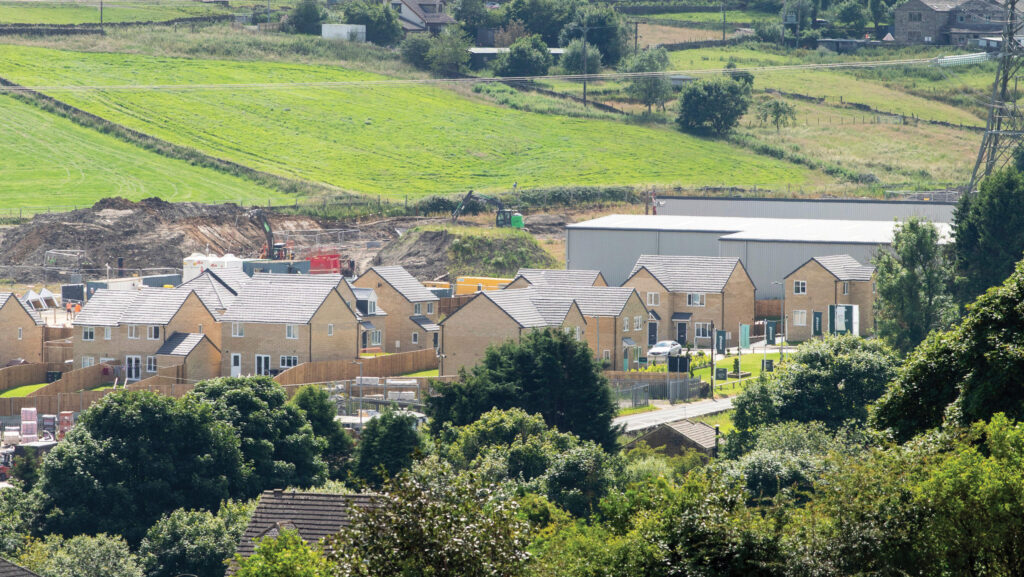Compulsory purchase reform ahead – what’s planned?
 © Windmill Images/Alamy Stock Photo
© Windmill Images/Alamy Stock Photo A planning and infrastructure bill is due to be introduced early this year.
Alongside other planning reforms, it is proposed to include wider compulsory purchase (CP) powers and restrict compensation to landowners.
A consultation published on 19 December 2024 sets out reforms that expand on provisions in the Levelling Up and Regeneration Act 2023.
These allow “hope value” to be removed in circumstances where social and affordable housing is being built, also for educational and NHS purposes, providing there is justification in the public interest.
See also: Reclaiming professional fees paid by farmers on compulsory purchase
What is proposed?
A key proposal is to extend this ability to disapply hope value to include CP orders made on behalf of parish, town or community councils by local authorities under section 125 of the Local Government Act 1972.
This would apply where the schemes involved are providing affordable or social housing.
“It’s unusual for town and community councils to be considering compulsory purchase because of the risks involved, unless they are in a joint venture with a developer,” says planning lawyer Fergus Charlton, a partner with Michelmores.
“This is pushing in the direction for the delivery of more housing and makes it more likely that a landowner will be served with a compulsory purchase order,” he says.
The consultation refers to the government’s desire that landowners should get a “fair” rather than “elevated” value for land taken by CP. However, “fair” in this instance simply means agricultural value.
Henry Church is a senior director with CBRE UK, a commercial real estate service and investment company.
He also has a long-standing relationship with the Compulsory Purchase Association, an independent organisation promoting best practice in the field.
Speaking in a personal capacity as a CP practitioner, Henry takes issue with the words “fair” and “elevated”.
“What this is seeking is for there to be payment for existing use value, ignoring any potentiality in the land,” he says.
“This approach goes against the principle of equivalence, which says that those subject to compulsory purchase should be put in no worse a position as a result of the process.”
Like many others, he thinks that the move could reduce the amount of land coming forward for housing, as those promoting it may fear spending to do so only to have it subsequently taken from them by CP.
“By disapplying hope value, you’re not getting rid of that value, you’re giving it to someone else.
“You need to be responsible about what you do with that value. So who does it go to – the local authority or the developer?
The cost of land is a factor in development, but disapplying hope value as a means of addressing the rate of housebuilding is too simplistic and risks land not being brought forward, says Henry.

© ZarkePix/Alamy Stock Photo
Other measures
The consultation goes further in seeking to allow land to be compulsorily purchased without hope value.
The government is considering a general power to enable the secretary of state in England or the ministers in Wales to make a direction to remove hope value from compensation for a specific category of sites where this is justified in the public interest.
It suggests this could include land allocated for residential development in an adopted plan but which has not come forward for development.
This could bring a much wider range of farmland into the net of CP with no hope value, while some commentators have interpreted it as being aimed at those holding potential development land but not yet developing it – often referred to as land banking.
Land costs and development
The Country Land and Business Association (CLA) has long argued that land costs are a relatively small part of total development costs.
Compulsory purchase compensation aims to put those affected in the same position as if their land had not been taken.
However, this is rarely the outcome, says CLA chief surveyor Andrew Shirley.
The ability to remove hope value was introduced by the previous government and criticised by him as singling out land value as if that was going to solve the problem.
“A key consideration for the valuation process is what the land might be worth if sold on the open market by a willing seller,” he says, also criticising the planning process for delays and the recent revision of the National Planning Policy Framework for offering nothing to the rural economy.
“Hope value is real value, not a made-up value,” says Andrew.
“If a developer were to buy a field they would pay a value to reflect its development potential. Removing hope value [from the CP process] means the only person not making money from it is the landowner.”
Opportunity to develop before new laws
The planning and infrastructure bill may take one to two years to become law.
In the meantime, the CLA’s message is that is if someone feels they have development potential on their land, they should promote it, submit it for planning and/or sell or develop it, says Andrew.
If the proposals become law, it is expected that one result will be more joint ventures between local planning authorities and developers, whereby the developers fund or part-fund the compulsory purchase process in order to access the development land subject to the CP order.
Compulsory purchase powers
Compulsory purchase (CP) is a legal process by which land can be taken without the consent of the owner.
These powers are granted to local authorities, government departments and to other public and private bodies by legislation.
This includes mayoral combined authorities and other public bodies, including Homes England.
CP powers can only be used if it is deemed that there is a compelling case in the public interest to do so – for example, for infrastructure projects such as railways, roads, energy, electricity infrastructure, schools, hospitals, housing, and urban regeneration.
The government says that the proposed changes to the CP regime aim to speed up decision-making, reduce the cost of the process and ensure the compensation paid to landowners is fair.
Other changes in the government’s consultation
Where a CP is proposed and a direction to remove hope value is sought and opposed, the government wants the decision to be made by a planning inspector rather than the secretary of state or a minister.
Also, where a “no hope value” CP order has been made but there are no objections to the order, the government then the acquiring authority would have the power to confirm the decision, rather than the secretary of state or minister.
This would require an amendment to the Acquisition of Land Act 1981.
Law Commission compulsory purchase review
At the same time as the government’s consultation on compulsory purchase, the Law Commission of England and Wales is reviewing the system and also launched a consultation on 20 December 2024.
This work began in February 2023 and will suggest how to consolidate, modernise and simplify compulsory purchase legislation, with a resulting draft bill proposing technical changes to compulsory purchase procedure and compensation.
There have been frequent calls for reform of the complex and dated CP legislation, some of which dates back to 1845.
How to respond to the consultation
The consultation document is available online.
Responses can also be made online or by emailing CompulsoryPurchaseConsultation@communities.gov.uk
or by post addressed to:
Compulsory Purchase Consultation Team
Planning – Development Management Division
Ministry of Housing, Communities and Local Government
Floor 3, Fry Building
2 Marsham Street
London SW1P 4DF
